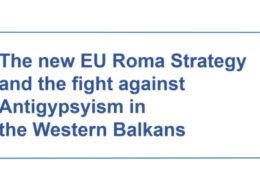The Central Council of German Sinti and Roma has great expectations for the EU Council Presidency, which Germany is taking over today for the next six months.
“Germany now has a great responsibility and opportunity to lead a united and just Europe out of it´s current crisis. The Central Council of German Sinti and Roma expressly welcomes Germany’s commitment to resolutely combat the growing and often violent antigypsyism in Europe and to adopt the new post-2020 EU Framework for Roma Equality, Participation and Inclusion this autumn. The often violent antigypsyism, this specific form of racism that affects Sinti and Roma, is the root cause for the desolate situation in which many Roma have to live in their home countries”, said Romani Rose.
The chairman of the Central Council of German Sinti and Roma underlined the specific historical responsibility of the Federal Republic of Germany to decisively fight antigypsyism, racism and antisemitism in Europe:
“Today Europe is again facing a new nationalism, antigypsyism and antisemitism. It is abhorrent that even during this pandemic, which threatens the whole world, extreme right-wing and nationalist politicians in numerous countries are deliberately stirring up racist sentiment against Roma. Recently we have witnessed numerous right-wing terrorist murders in Germany and other European countries. The Central Council therefore calls on all EU member states to acknowledge the Holocaust of 500,000 Sinti and Roma murdered in Nazi-occupied Europe. The recognition and combating of antigypsyism is a fundamental obligation to defend the rule of law and democracy in Europe”, said Rose.
The Central Council sees Europe facing major challenges in dealing with the Covid-19 pandemic. More than ever, the effects of the Corona crisis show that the European Union and the EU Member States as well as the countries of the Western Balkans must commit themselves to a sustainable improvement of the situation of Roma in Europe and to the fight against antigypsyism.
In recent decades, a systematic policy of exclusion has led to hundreds of thousands of people living in marginalised, inhumane settlements, often without sufficient access to drinking water or any basic services. Access to work and education, to decent housing and to health care was set as an objective as early as 2011 in the first EU framework strategy, but since then the situation of large parts of the Roma communities has improved at best selectively, but often deteriorated considerably.
In October 2020, the European Commission will present the new EU Framework for Roma Equality, Participation and Inclusion with a focus on fighting antigypsyism. The Central Council of German Sinti and Roma expects that the German Federal Government, during its EU Council Presidency, will lead all member states as well as the EU accession countries in the Western Balkans to a strong and binding political commitment for the implementation of this strategy.
The Central Council of German Sinti and Roma believes that also Germany has a duty to increase its efforts to combat antigypsyism, and to implement the EU framework at local, state and federal level. The Independent Commission on Antigypsyism, which was established by the Federal Government in spring 2019, is expected to present its results and recommendations for action to the Federal Government and the Bundestag at the beginning of 2021. The Central Council suggests that the Federal Government develops and adopts a “National Framework for the Fight against Antigypsyism and the Equal Participation of Sinti and Roma” before the end of this legislative term. This framework should take up the recommendations of the Independent Commission on Antigypsyism and ensure the implementation of the new EU framework strategy in Germany.
The Central Council of German Sinti and Roma calls on the Federal Government to coordinate a dialogue and consultation process with the federal states and local authorities, with Sinti and Roma self-organizations as well as with the wider civil society and with specialized institutions in order to define future goals and measures. As a basis for this consultation process, the Central Council of German Sinti and Roma presents three Roma Civil Monitor reports on the implementation of the previous “Integrated Packages of Measures for the Integration and Participation of Sinti and Roma in Germany” (2011-2020).




